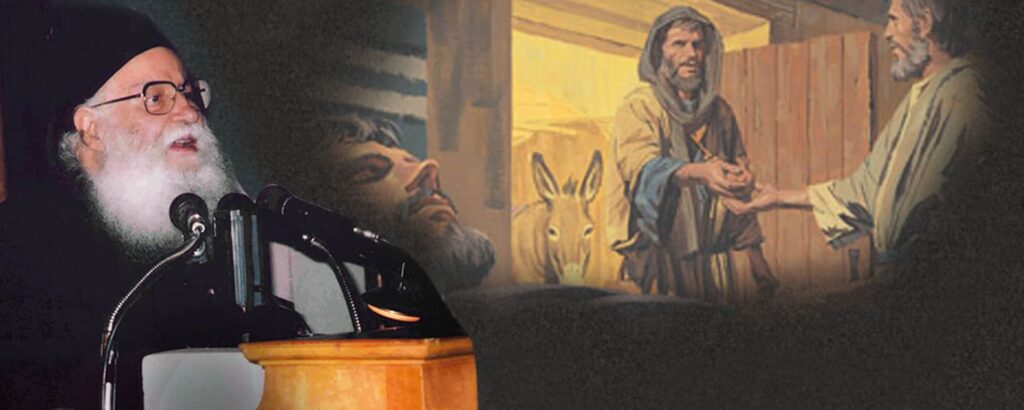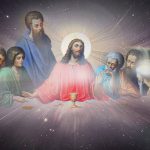
THE PARABLE OF THE GOOD SAMARITAN – THE CHURCH AS INN, INFIRMARY, ARK OF SALVATION
The parable of the Good Samaritan. The Church as Inn, Infirmary, Ark of salvation - Fr. Athanasios Mitilinaios
Eighth Sunday of Luke (Luke 10:25-37), Homily Β60
My beloved, if we only had the parable of the Good Samaritan, which we heard in today’s gospel passage, if only this parable were written down, together with the parable of the Prodigal Son, it would be enough to give us a marvelous outline of man’s fall, God’s love and the salvation of humanity. We see this in today’s parable, especially when it says, a certain man was going down from Jerusalem to Jericho. (Jerusalem stands for Paradise of old; and Jericho, the land of misery and apostasy. Falling into the hands of brigands is nothing but the fall of man into the hands of demons and the passions.) Furthermore, the priest and the Levite who approach, come and go, passing him right by, so the ritual law, the law of ethics and their way of life did not help them.
Then the Good Samaritan approaches. He stands for the incarnate Son of God and the compassion of God. He admits to the Inn the wounded man who had fallen into the hands of the brigands. The wounded man stands for humanity and the Inn stands for the Church, which is also an infirmary where one receives treatment and the Ark that saves.
All the emphasis of the parable falls on the person of the Samaritan and the Inn. I beg you to pay attention. The Inn is the Church. As you know, in the old days there was no such thing as a hotel, only the inn; the inn accepted everyone, whether well-dressed or poorly-dressed, rich or poor. If a beggar were to show up at a hotel today, not even a fancy one, he would not be permitted to stay if he is filthy and his clothing is tattered. The inn, however, accepted everyone, not only men and women, but animals as well, because they were travelers passing through, and they had their animals. The animals were led to the stables of the inn and they in the rooms. The inn [πανδοχείο], as its name implies [“παν” (anyone) + “δοχείο” (accepts)], accepted for anyone.
Have you ever really considered the Church to be an Inn that accepts anyone? Consider that it receives people in any condition, whether ragged, filthy or sick, no matter what. In other words, it accepts sinners, no matter what degree of sinner they are. The Church accepts everyone. Her objective is their sanctification, their perfection. As the Apostle Paul says, the Church has no other objective than the perfecting of God’s people (Eph 4:12), than to work out the commandment of God: “Become holy, for I am holy” (Lev 20:7). Whoever enters the Church, enters to become holy. Saint John Chrysostom offers the following very beautiful interpretation:
“Entering this refuge (Christ, that is) and finding humanity defiled, squalid, naked and bloodied, He bathes, anoints, nurtures and clothes it, He who became clothed in humanity receives him, and in this way He brings humanity back.”
Truly, one sees how much love God shows to “bring humanity back”, He picks it up and brings it to the Inn of the Church. The Church admits sinners and releases saints. In the early Church, something very moving was happening. Soon after entering the Church, former idolaters, those formerly unethical, and those who were formerly immoral became saints. Everyone entered from the main gate and went out from another gate of the Church to martyrdom! And they became martyrs! What a beautiful sight! Back then, everyone saw this happening frequently, but it has not happened like this for many years now, so we have only a small glimpse of how sinners were received into the Church and went out as saints and martyrs.
Actually, the Church receives the entire creation. As I said, the Church is an Inn. As an Inn, it does not accept people only, but material elements also. For example, when we celebrate a memorial, we have koliva, and when we celebrate an Artoklasia service, we have sweet bread. At times, we also put flowers in Church. All of these are material things. They represent the Creation. Whatever the Church receives, it sanctifies, in order that the entire creation may be sanctified, to unite everything with Christ, to make it into the Kingdom of God. Truly, the Church is an Inn.
But the Church is also an infirmary, because in this present world the faithful do nothing but battle constantly against the principalities and powers of darkness “in high places”, says the Apostle Paul (Eph 6:12). Consequently, the present life is nothing but an unending battlefield. Here battles are against wicked people and the wicked demons, but also against our former evil, corrupt and unjust self. Following every battle there are always injured, there are injuries and wounds. Those who are wounded in their battles, from their struggle and effort, arrive at the infirmary of the Church in order for them to be treated.
The Church is an infirmary. How beautiful! Consider how in the ancient world there were no hospitals. The inns took on the special function, as did the ancient Pagan temples, but had the essential features we know today, since there were no infirmaries. The Church emerged and stood out as the true infirmary both for souls, and no less, for bodies. Because when the Lord sends out His disciples, and through His disciples their successors, to heal all those who were sick among the people, this shows that the Church is nothing else but an infirmary, a clinic.
What medicines does she use? her wonderful medicines? They are the two denarii which the Good Samaritan gives to the innkeeper (who stands for the priest), saying: “Use these to heal my friend who is very sick, my greatly wounded friend (humanity)”. They are His word [λόγος] and the Sacraments. With these two denarii, the word of God and the Sacraments of the Church are are used by the Church, my beloved, to heal. Many times people say to me: “How can I get well? What must I do?” And I reply: “Come to Church and listen to the word of God”. I tell them this because I have seen it happen. It is a reality. Those who continuously and attentively listen to the word of God cultivate their soul, and their wounds, which they acquired because of their sins, heal. They stop sinning. These medicines, my beloved, are very very effective. The word of God and the Sacraments: Confession, Holy Communion, prayer... All of these are the means by which the Church treats her wounded faithful.
The Church is also an Ark of salvation. You remember the old story of Noah and his ark (Gen. 7:9). Whatever remained outside the ark was drowned. Whatever remained inside the ark was protected and saved. This is also how it is with the Ark of the Church, my beloved. (We know the ark of old was a prefigurement [τύπος] of the Church.) Whoever remains outside perishes. How do they perish? From the streams and flood of ideas and sights and obscenities and various sins. Every person perishes. It is impossible for anyone to be saved outside the Church. Only those who are in the Church are protected, these only are saved.
However, when we say “I am in the Church”, be careful here. We will remove a misunderstanding which people may have. When we say “I am in the Church” we do not mean I am in the temple. The temple is called “Church” by connotation, because the faithful are inside the temple. Therefore, to be in the Church does not mean that I am inside the temple, because I can be inside the temple, but not participate in God’s Sacraments, and if this is the case, then I am an outsider, I am estranged from the saving elements which Christ has given me. Someone will say “I am in the Church”, “I am a member”, as the Apostle Paul says “we are members of the Body of Christ” (1 Cor 12:27), but I am a member only when I am organically attached to the Body of Christ. This is what Church is.
The Church is the Body of Christ. Only when I commune of the Body and Blood of Christ and keep the commandments of God can I say that I am in the Church. Remember what the Lord says: “Whoever does not remain united with Me, as a branch to the vine, the trunk of the vine, and I am this trunk, does not bear fruit, but dries up and is gathered to be burned” (Jn. 15:6). This means that we must be belong organically, as a branch is connected to the trunk of the vine, and is given juice. So also must I be united with Christ, be a member of the Body of Christ, to have these juices of life, His Body and His Blood, flowing through me, which are, for me, life eternal. Only then can I say that I am in the Church, otherwise I am not. Do not be deceived.
If I try to fool myself, that I am a chanter or a council member or a groundskeeper of the Church, but do not receive Holy Communion, do not be deceived, I am outside the Church. Even if I am under the roof the Church, I am outside the Ark. I will be carried away by the flood and I will not be saved.
My beloved, I have been a priest for a number of years. Rarely, very rarely do I see chanters and council members receiving communion and going to confession. Why they do not, I do not know. It is not the time for me to tell you why, but I have learned this much and I have confirmed it: The chanters and the council members do not participate in the Sacraments of the Church.
At some point, at the Judgment, what the Lord told us will happen will happen with them: “Lord, didn’t You speak in our squares? Didn’t You come to our house to eat?” (Lk 13:26-27) In other words, the council members and the chanters and whoever else will say: “Lord, didn’t You come to us in the person of the priest and of the bishop to preach to us in the temple? Didn’t we take You home and offer You hospitality? Didn’t we set a fine table for You? How is it that You say You do not know us?” “I assure you,” the Lord says, “I do not know you, you workers of iniquity. Get out of here.” (Lk 13:27) Did you hear what the Lord said? It is frightful. Away with the deceptions, my beloved, away with the delusions. Only if I am repentant, only if I become a communicant of the Body and Blood of Christ, only if I am worthy as much as humanly possible, only if I keep the commandments of God, only then can I say that I am in the Church. Only then can I maintain the hope that I will be saved. Only then. But know this much, “outside the Church there is no salvation”, St. Cyprian of Carthage says clearly (Epistle 72, 21).
My beloved, we have seen that the Church is the great workshop of sanctification, the Inn which receives the rational and irrational creation to sanctify them, to make them incorruptible, to make them immortal, to lead them to the bliss of God. We have also seen that the Church is a marvelous infirmary and the true Ark which saves.
But let us close with these marvelous words of Holy Saint John Chrysostom: “Do not separate from the Church; there is no bastion other than the Church. Your hope? The Church. Your salvation? The Church. Your refuge? The Church.”
ΤΕΛΟΣ ΚΑΙ ΤΩ ΘΕΩ ΔΟΞΑ


